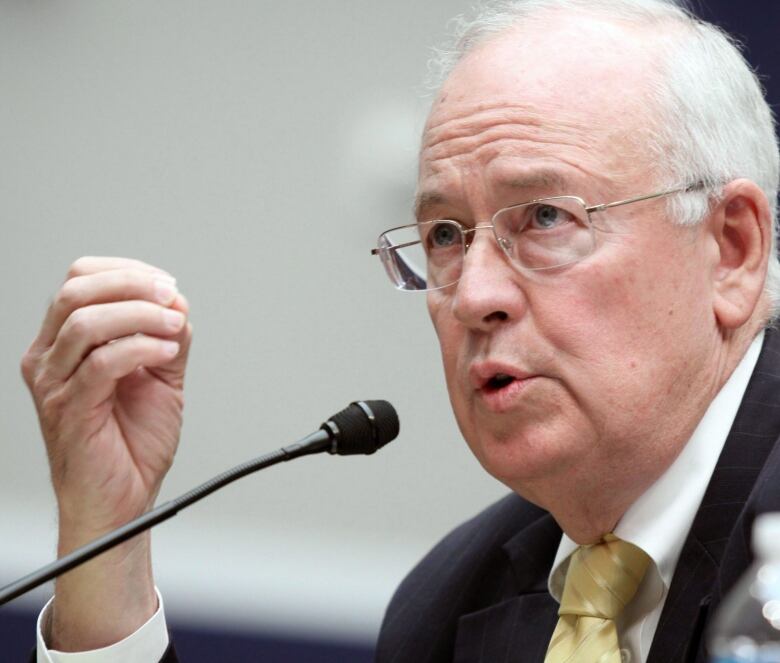Comey's revenge: Why 'Trump has bigger problems now' with special counsel Robert Mueller
President faces empowered counsel with greater independence on Russia probe

If former FBI director James Comey could give a name to personify his revenge after being fired, Robert S. Mueller III might be it.
Comey was overseeing the investigation into U.S. President Donald Trump's associates' alleged ties with Russia until last week, when Trump sacked him amid reported efforts to expand the probe. Instead, Comey's good friend Mueller, a quintessential G-Man who preceded Comey as chief at the bureau from 2001 until 2013, steps into the oversight role.
Trump, who maintains there was no collusion with the Kremlin and calls the investigation a "witch hunt," may not be pleased with the switch-up.
After being tapped on Wednesday to be the special counsel on the Trump-Russia probe, Mueller is endowed with sweeping prosecutorial powers and greater independence.

That in theory gives him authority to investigate the circumstances around Comey's abrupt dismissal, among other matters that could be tangentially linked to the Russia investigation.
"Trump has bigger problems now with Mueller as an independent counsel," says Barak Cohen, a former federal corruption prosecutor now with the Washington law firm Perkins Coie.
Mueller's designation falls outside the normal Department of Justice chain of command, giving him "an extra layer of impartiality" from the White House, Cohen says. And he will also have a broad legal ambit.
"When prosecutors start investigating cases, there's a starting point," Cohen says. "There's Point X, but they'll go any variety of directions, and if they find new evidence, they'll follow that, too."
Echoes of Clinton investigation
Take, for example, Ken Starr's investigation during the 1990s of the Whitewater controversy. An initial probe of real estate investments arguably devolved into a fishing expedition that turned up former president Bill Clinton's affair with Monica Lewinsky.

As outside counsel, Mueller will have broad resources, including the go-ahead to recruit FBI agents and analysts, the capacity to staff his own team with security clearances, work out of a new secure facility, and dig anywhere the Trump-Russia investigation may lead.
"If the idea by the White House was to remove Comey in order to block the investigation, that was foolish," said former U.S. attorney general Alberto Gonzales.
"The fact is, independent prosecutors can go far afield in investigating things."
Trump's tax returns could be subpoenaed if they fall within the scope of his wider probe. Mueller could also interview Trump, convene a grand jury and bring criminal charges.

Six words in Deputy Attorney General Rod Rosenstein's order appointing Mueller expressly allow this to happen. Mueller can explore any matters that "may arise directly from the investigation," even if something seems to be on the margins of the main Trump-Russia probe.
The former attorney general holds Mueller in high regard as someone who reported to him almost every morning for three years at the Justice Department.
'Serious political implications'
While Gonzales notes that Trump, as head of the executive branch, can technically fire Mueller, "there would be serious political implications" were Trump to remove him now.
"To do that after having courted controversy by already firing Comey would leave [Trump] skating on even thinner ice," says Rajan Menon, an expert on Russia who teaches international relations at the City College of New York.
Any apparent attempt by anyone associated with Trump, to say nothing of Trump himself, to impede Mueller's investigation "will make this already bad situation worse for the president."

Mueller's appointment was applauded by lawmakers on both sides of the aisle, and was seen as restoring credibility to the Justice Department following the blaming of Comey's dismissal on the assistant attorney general.
"With Mueller, you've got a home run," says Chris Swecker, a former FBI lead on the criminal division who served directly under Mueller for two years.
'He's the exact right person'
"He's the exact right person. He's been a line-level homicide prosecutor in D.C., right there in the trenches. He's been the FBI director for 12 years, and he's darkened the door of a courtroom, so you bet he knows how to prosecute."
Swecker is also confident Mueller will work expeditiously, citing a no-nonsense approach as a prosecutor, and hopefully pacifying possible fears the investigation could drag on for years.

"I'll bet a steak dinner that it won't take longer than a year before we start seeing some actual action … towards some sort of prosecution."
That may come at the expense of the American public's appetite for details and investigation updates. Federal prosecutors do their work in the dark, and Mueller is expected to plug potential leaks and tamp down headlines, giving Republicans some respite.
The press isn't going to get progress reports.-— Chris Swecker, ex-FBI official
"The press isn't going to get progress reports. It's going to get dark for a while," says Swecker, who is skeptical of any Trump-Russian collusion. "That will be good for the administration. They'll get away from this topic for a while."
Mueller, who will resign from the law firm WilmerHale, is accustomed to high-pressure investigations under intense scrutiny. He assumed the FBI directorship just days before the Sept. 11, 2001, attacks and had his decade-long tenure extended after the Republican administration of George W. Bush and while serving under Democratic president Barack Obama.

A rare Mueller detractor is former senator Bob Graham, who sparred with him when the Democrat from Florida co-chaired the joint congressional inquiry into intelligence lapses before 9/11. Although Graham welcomed the appointment of an independent prosecutor, he made it clear Mueller would not have made his short list.
"We butted heads over information on several instances," Graham said about his time on the 9/11 Review Commission.
Still, Graham is reserving judgment.
"I'm prepared to give him the chance to redeem himself," he said. "I hope he feels there is a sense of a clock ticking, and that consequences to delay this will cause him to move judiciously."

